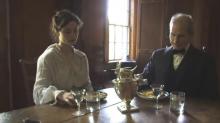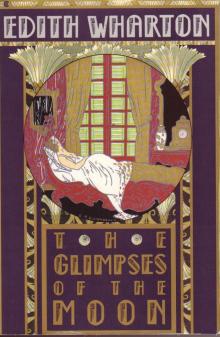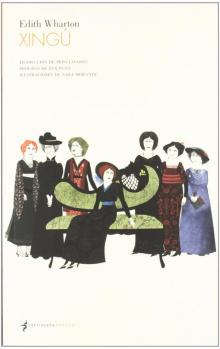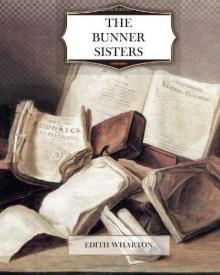- Home
- Edith Wharton
Bunner Sisters Page 9
Bunner Sisters Read online
Page 9
But there was little time to brood upon such problems. The care of Evelina filled Ann Eliza's days and nights. The hastily summoned doctor had pronounced her to be suffering from pneumonia, and under his care the first stress of the disease was relieved. But her recovery was only partial, and long after the doctor's visits had ceased she continued to lie in bed, too weak to move, and seemingly indifferent to everything about her.
At length one evening, about six weeks after her return, she said to her sister: "I don't feel's if I'd ever get up again."
Ann Eliza turned from the kettle she was placing on the stove. She was startled by the echo the words woke in her own breast.
"Don't you talk like that, Evelina! I guess you're on'y tired out--and disheartened."
"Yes, I'm disheartened," Evelina murmured.
A few months earlier Ann Eliza would have met the confession with a word of pious admonition; now she accepted it in silence.
"Maybe you'll brighten up when your cough gets better," she suggested.
"Yes--or my cough'll get better when I brighten up," Evelina retorted with a touch of her old tartness.
"Does your cough keep on hurting you jest as much?"
"I don't see's there's much difference."
"Well, I guess I'll get the doctor to come round again," Ann Eliza said, trying for the matter-of-course tone in which one might speak of sending for the plumber or the gas-fitter.
"It ain't any use sending for the doctor--and who's going to pay him?"
"I am," answered the elder sister. "Here's your tea, and a mite of toast. Don't that tempt you?"
Already, in the watches of the night, Ann Eliza had been tormented by that same question--who was to pay the doctor?--and a few days before she had temporarily silenced it by borrowing twenty dollars of Miss Mellins. The transaction had cost her one of the bitterest struggles of her life. She had never borrowed a penny of any one before, and the possibility of having to do so had always been classed in her mind among those shameful extremities to which Providence does not let decent people come. But nowadays she no longer believed in the personal supervision of Providence; and had she been compelled to steal the money instead of borrowing it, she would have felt that her conscience was the only tribunal before which she had to answer. Nevertheless, the actual humiliation of having to ask for the money was no less bitter; and she could hardly hope that Miss Mellins would view the case with the same detachment as herself. Miss Mellins was very kind; but she not unnaturally felt that her kindness should be rewarded by according her the right to ask questions; and bit by bit Ann Eliza saw Evelina's miserable secret slipping into the dress-maker's possession.
When the doctor came she left him alone with Evelina, busying herself in the shop that she might have an opportunity of seeing him alone on his way out. To steady herself she began to sort a trayful of buttons, and when the doctor appeared she was reciting under her breath: "Twenty-four horn, two and a half cards fancy pearl . . ." She saw at once that his look was grave.
He sat down on the chair beside the counter, and her mind travelled miles before he spoke.
"Miss Bunner, the best thing you can do is to let me get a bed for your sister at St. Luke's."
"The hospital?"
"Come now, you're above that sort of prejudice, aren't you?" The doctor spoke in the tone of one who coaxes a spoiled child. "I know how devoted you are--but Mrs. Ramy can be much better cared for there than here. You really haven't time to look after her and attend to your business as well. There'll be no expense, you understand--"
Ann Eliza made no answer. "You think my sister's going to be sick a good while, then?" she asked.
"Well, yes--possibly."
"You think she's very sick?"
"Well, yes. She's very sick."
His face had grown still graver; he sat there as though he had never known what it was to hurry.
Ann Eliza continued to separate the pearl and horn buttons. Suddenly she lifted her eyes and looked at him. "Is she going to die?"
The doctor laid a kindly hand on hers. "We never say that, Miss Bunner. Human skill works wonders--and at the hospital Mrs. Ramy would have every chance."
"What is it? What's she dying of?"
The doctor hesitated, seeking to substitute a popular phrase for the scientific terminology which rose to his lips.
"I want to know," Ann Eliza persisted.
"Yes, of course; I understand. Well, your sister has had a hard time lately, and there is a complication of causes, resulting in consumption--rapid consumption. At the hospital--"
"I'll keep her here," said Ann Eliza quietly.
After the doctor had gone she went on for some time sorting the buttons; then she slipped the tray into its place on a shelf behind the counter and went into the back room. She found Evelina propped upright against the pillows, a flush of agitation on her cheeks. Ann Eliza pulled up the shawl which had slipped from her sister's shoulders.
"How long you've been! What's he been saying?"
"Oh, he went long ago--he on'y stopped to give me a prescription. I was sorting out that tray of buttons. Miss Mellins's girl got them all mixed up."
She felt Evelina's eyes upon her.
"He must have said something: what was it?"
"Why, he said you'd have to be careful--and stay in bed--and take this new medicine he's given you."
"Did he say I was going to get well?"
"Why, Evelina!"
"What's the use, Ann Eliza? You can't deceive me. I've just been up to look at myself in the glass; and I saw plenty of 'em in the hospital that looked like me. They didn't get well, and I ain't going to." Her head dropped back. "It don't much matter-- I'm about tired. On'y there's one thing--Ann Eliza--"
The elder sister drew near to the bed.
"There's one thing I ain't told you. I didn't want to tell you yet because I was afraid you might be sorry--but if he says I'm going to die I've got to say it." She stopped to cough, and to Ann Eliza it now seemed as though every cough struck a minute from the hours remaining to her.
"Don't talk now--you're tired."
"I'll be tireder to-morrow, I guess. And I want you should know. Sit down close to me--there."
Ann Eliza sat down in silence, stroking her shrunken hand.
"I'm a Roman Catholic, Ann Eliza."
"Evelina--oh, Evelina Bunner! A Roman Catholic--you? Oh, Evelina, did he make you?"
Evelina shook her head. "I guess he didn't have no religion; he never spoke of it. But you see Mrs. Hochmuller was a Catholic, and so when I was sick she got the doctor to send me to a Roman Catholic hospital, and the sisters was so good to me there--and the priest used to come and talk to me; and the things he said kep' me from going crazy. He seemed to make everything easier."
"Oh, sister, how could you?" Ann Eliza wailed. She knew little of the Catholic religion except that "Papists" believed in it--in itself a sufficient indictment. Her spiritual rebellion had not freed her from the formal part of her religious belief, and apostasy had always seemed to her one of the sins from which the pure in mind avert their thoughts.
"And then when the baby was born," Evelina continued, "he christened it right away, so it could go to heaven; and after that, you see, I had to be a Catholic."
"I don't see--"
"Don't I have to be where the baby is? I couldn't ever ha' gone there if I hadn't been made a Catholic. Don't you understand that?"
Ann Eliza sat speechless, drawing her hand away. Once more she found herself shut out of Evelina's heart, an exile from her closest affections.
"I've got to go where the baby is," Evelina feverishly insisted.
Ann Eliza could think of nothing to say; she could only feel that Evelina was dying, and dying as a stranger in her arms. Ramy and the day-old baby had parted her forever from her sister.
Evelina began again. "If I get worse I want you to send for a priest. Miss Mellins'll know where to send--she's got an aunt that's a Catholic. Promise me faithful you w
ill."
"I promise," said Ann Eliza.
After that they spoke no more of the matter; but Ann Eliza now understood that the little black bag about her sister's neck, which she had innocently taken for a memento of Ramy, was some kind of sacrilegious amulet, and her fingers shrank from its contact when she bathed and dressed Evelina. It seemed to her the diabolical instrument of their estrangement.
XIII
SPRING had really come at last. There were leaves on the ailanthus-tree that Evelina could see from her bed, gentle clouds floated over it in the blue, and now and then the cry of a flower- seller sounded from the street.
One day there was a shy knock on the back-room door, and Johnny Hawkins came in with two yellow jonquils in his fist. He was getting bigger and squarer, and his round freckled face was growing into a smaller copy of his father's. He walked up to Evelina and held out the flowers.
"They blew off the cart and the fellow said I could keep 'em. But you can have 'em," he announced.
Ann Eliza rose from her seat at the sewing-machine and tried to take the flowers from him.
"They ain't for you; they're for her," he sturdily objected; and Evelina held out her hand for the jonquils.
After Johnny had gone she lay and looked at them without speaking. Ann Eliza, who had gone back to the machine, bent her head over the seam she was stitching; the click, click, click of the machine sounded in her ear like the tick of Ramy's clock, and it seemed to her that life had gone backward, and that Evelina, radiant and foolish, had just come into the room with the yellow flowers in her hand.
When at last she ventured to look up, she saw that her sister's head had drooped against the pillow, and that she was sleeping quietly. Her relaxed hand still held the jonquils, but it was evident that they had awakened no memories; she had dozed off almost as soon as Johnny had given them to her. The discovery gave Ann Eliza a startled sense of the ruins that must be piled upon her past. "I don't believe I could have forgotten that day, though," she said to herself. But she was glad that Evelina had forgotten.
Evelina's disease moved on along the usual course, now lifting her on a brief wave of elation, now sinking her to new depths of weakness. There was little to be done, and the doctor came only at lengthening intervals. On his way out he always repeated his first friendly suggestion about sending Evelina to the hospital; and Ann Eliza always answered: "I guess we can manage."
The hours passed for her with the fierce rapidity that great joy or anguish lends them. She went through the days with a sternly smiling precision, but she hardly knew what was happening, and when night-fall released her from the shop, and she could carry her work to Evelina's bedside, the same sense of unreality accompanied her, and she still seemed to be accomplishing a task whose object had escaped her memory.
Once, when Evelina felt better, she expressed a desire to make some artificial flowers, and Ann Eliza, deluded by this awakening interest, got out the faded bundles of stems and petals and the little tools and spools of wire. But after a few minutes the work dropped from Evelina's hands and she said: "I'll wait until to- morrow."
She never again spoke of the flower-making, but one day, after watching Ann Eliza's laboured attempt to trim a spring hat for Mrs. Hawkins, she demanded impatiently that the hat should be brought to her, and in a trice had galvanized the lifeless bow and given the brim the twist it needed.
These were rare gleams; and more frequent were the days of speechless lassitude, when she lay for hours silently staring at the window, shaken only by the hard incessant cough that sounded to Ann Eliza like the hammering of nails into a coffin.
At length one morning Ann Eliza, starting up from the mattress at the foot of the bed, hastily called Miss Mellins down, and ran through the smoky dawn for the doctor. He came back with her and did what he could to give Evelina momentary relief; then he went away, promising to look in again before night. Miss Mellins, her head still covered with curl-papers, disappeared in his wake, and when the sisters were alone Evelina beckoned to Ann Eliza.
"You promised," she whispered, grasping her sister's arm; and Ann Eliza understood. She had not yet dared to tell Miss Mellins of Evelina's change of faith; it had seemed even more difficult than borrowing the money; but now it had to be done. She ran upstairs after the dress-maker and detained her on the landing.
"Miss Mellins, can you tell me where to send for a priest--a Roman Catholic priest?"
"A priest, Miss Bunner?"
"Yes. My sister became a Roman Catholic while she was away. They were kind to her in her sickness--and now she wants a priest." Ann Eliza faced Miss Mellins with unflinching eyes.
"My aunt Dugan'll know. I'll run right round to her the minute I get my papers off," the dress-maker promised; and Ann Eliza thanked her.
An hour or two later the priest appeared. Ann Eliza, who was watching, saw him coming down the steps to the shop-door and went to meet him. His expression was kind, but she shrank from his peculiar dress, and from his pale face with its bluish chin and enigmatic smile. Ann Eliza remained in the shop. Miss Mellins's girl had mixed the buttons again and she set herself to sort them. The priest stayed a long time with Evelina. When he again carried his enigmatic smile past the counter, and Ann Eliza rejoined her sister, Evelina was smiling with something of the same mystery; but she did not tell her secret.
After that it seemed to Ann Eliza that the shop and the back room no longer belonged to her. It was as though she were there on sufferance, indulgently tolerated by the unseen power which hovered over Evelina even in the absence of its minister. The priest came almost daily; and at last a day arrived when he was called to administer some rite of which Ann Eliza but dimly grasped the sacramental meaning. All she knew was that it meant that Evelina was going, and going, under this alien guidance, even farther from her than to the dark places of death.
When the priest came, with something covered in his hands, she crept into the shop, closing the door of the back room to leave him alone with Evelina.
It was a warm afternoon in May, and the crooked ailanthus-tree rooted in a fissure of the opposite pavement was a fountain of tender green. Women in light dresses passed with the languid step of spring; and presently there came a man with a hand-cart full of pansy and geranium plants who stopped outside the window, signalling to Ann Eliza to buy.
An hour went by before the door of the back room opened and the priest reappeared with that mysterious covered something in his hands. Ann Eliza had risen, drawing back as he passed. He had doubtless divined her antipathy, for he had hitherto only bowed in going in and out; but to day he paused and looked at her compassionately.
"I have left your sister in a very beautiful state of mind," he said in a low voice like a woman's. "She is full of spiritual consolation."
Ann Eliza was silent, and he bowed and went out. She hastened back to Evelina's bed, and knelt down beside it. Evelina's eyes were very large and bright; she turned them on Ann Eliza with a look of inner illumination.
"I shall see the baby," she said; then her eyelids fell and she dozed.
The doctor came again at nightfall, administering some last palliatives; and after he had gone Ann Eliza, refusing to have her vigil shared by Miss Mellins or Mrs. Hawkins, sat down to keep watch alone.
It was a very quiet night. Evelina never spoke or opened her eyes, but in the still hour before dawn Ann Eliza saw that the restless hand outside the bed-clothes had stopped its twitching. She stooped over and felt no breath on her sister's lips.
The funeral took place three days later. Evelina was buried in Calvary Cemetery, the priest assuming the whole care of the necessary arrangements, while Ann Eliza, a passive spectator, beheld with stony indifference this last negation of her past.
A week afterward she stood in her bonnet and mantle in the doorway of the little shop. Its whole aspect had changed. Counter and shelves were bare, the window was stripped of its familiar miscellany of artificial flowers, note-paper, wire hat-frames, and limp garments fro
m the dyer's; and against the glass pane of the doorway hung a sign: "This store to let."
Ann Eliza turned her eyes from the sign as she went out and locked the door behind her. Evelina's funeral had been very expensive, and Ann Eliza, having sold her stock-in-trade and the few articles of furniture that remained to her, was leaving the shop for the last time. She had not been able to buy any mourning, but Miss Mellins had sewed some crape on her old black mantle and bonnet, and having no gloves she slipped her bare hands under the folds of the mantle.
It was a beautiful morning, and the air was full of a warm sunshine that had coaxed open nearly every window in the street, and summoned to the window-sills the sickly plants nurtured indoors in winter. Ann Eliza's way lay westward, toward Broadway; but at the corner she paused and looked back down the familiar length of the street. Her eyes rested a moment on the blotched "Bunner Sisters" above the empty window of the shop; then they travelled on to the overflowing foli- age of the Square, above which was the church tower with the dial that had marked the hours for the sisters before Ann Eliza had bought the nickel clock. She looked at it all as though it had been the scene of some unknown life, of which the vague report had reached her: she felt for herself the only remote pity that busy people accord to the misfortunes which come to them by hearsay.
She walked to Broadway and down to the office of the house- agent to whom she had entrusted the sub-letting of the shop. She left the key with one of his clerks, who took it from her as if it had been any one of a thousand others, and remarked that the weather looked as if spring was really coming; then she turned and began to move up the great thoroughfare, which was just beginning to wake to its multitudinous activities.
She walked less rapidly now, studying each shop window as she passed, but not with the desultory eye of enjoyment: the watchful fixity of her gaze overlooked everything but the object of its quest. At length she stopped before a small window wedged between two mammoth buildings, and displaying, behind its shining plate- glass festooned with muslin, a varied assortment of sofa-cushions, tea-cloths, pen-wipers, painted calendars and other specimens of feminine industry. In a corner of the window she had read, on a slip of paper pasted against the pane: "Wanted, a Saleslady," and after studying the display of fancy articles beneath it, she gave her mantle a twitch, straightened her shoulders and went in.

 The Age of Innocence
The Age of Innocence The Reef
The Reef Summer
Summer The Glimpses of the Moon
The Glimpses of the Moon Xingu
Xingu The Fruit of the Tree
The Fruit of the Tree Fast and Loose
Fast and Loose Artemis to Actaeon and Other Verse
Artemis to Actaeon and Other Verse The Line of Least Resistance
The Line of Least Resistance The Lamp of Psyche
The Lamp of Psyche The Reckoning
The Reckoning Afterward
Afterward The New York Stories of Edith Wharton
The New York Stories of Edith Wharton The 2014 Halloween Horrors Megapack
The 2014 Halloween Horrors Megapack 'Copy': A Dialogue
'Copy': A Dialogue The Recovery
The Recovery The Fulness of Life
The Fulness of Life Early Short Stories Vol. 1
Early Short Stories Vol. 1 Tales of Men and Ghosts
Tales of Men and Ghosts The House of the Dead Hand
The House of the Dead Hand That Good May Come
That Good May Come The Buccaneers
The Buccaneers Other Times, Other Manners
Other Times, Other Manners The Hermit and the Wild Woman
The Hermit and the Wild Woman Kerfol
Kerfol The Duchess at Prayer
The Duchess at Prayer Bunner Sisters
Bunner Sisters The Choice
The Choice Madame De Treymes
Madame De Treymes Ethan Frome, Summer, Bunner Sisters
Ethan Frome, Summer, Bunner Sisters In Morocco
In Morocco The Valley of Decision
The Valley of Decision Age of Innocence (Barnes & Noble Classics Series)
Age of Innocence (Barnes & Noble Classics Series) The Angel at the Grave
The Angel at the Grave April Showers
April Showers Sanctuary
Sanctuary The Bunner Sisters
The Bunner Sisters Mrs. Manstey's View
Mrs. Manstey's View Writing a War Story
Writing a War Story The Custom of the Country
The Custom of the Country In Trust
In Trust The Triumph of the Night
The Triumph of the Night The Hermit and the Wild Woman, and Other Stories
The Hermit and the Wild Woman, and Other Stories Roman Fever and Other Stories
Roman Fever and Other Stories The Mission of Jane
The Mission of Jane The Descent of Man and Other Stories
The Descent of Man and Other Stories Coming Home
Coming Home The Touchstone
The Touchstone Early Short Stories Vol. 2
Early Short Stories Vol. 2 Edith Wharton's Verse, 1879-1919, from various journals.
Edith Wharton's Verse, 1879-1919, from various journals.